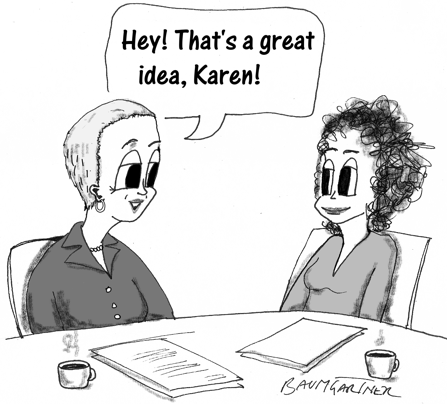
MBTI, Brainstorming and Making Employees Feel Good
By Jeffrey Baumgartner
Are you familiar with the Myers-Briggs Type Indicator (MBTI)? It is a popular exercise in which people complete a questionnaire and are then tagged with on of 16 personality types. According to one of its vendors, it helps in team development, leadership development, conflict resolution and all kinds of good things. MBTI has also been clinically tested and found to be, and I don't know how to put this nicely: absolutely useless.
This makes MBTI a lot like brainstorming, another popular exercise that many businesses use in order to pretend to be innovative. Brainstorming has also been clinically tested and found to be useless.
This raises an interesting question. Why are these services so widely used if a bit of research on Google demonstrates that their value is doubtful? Perhaps part of the problem is that the results of those clinical tests are published in rather dry research papers which, at best, are cited by science and psychology blogs. The defenders of MBTI and brainstorming, on the other hand, are generally vendors who, by definition, are better salespeople than psychology researchers.
Money
One big reason for the persistence of MBTI and brainstorming is that many companies and individuals make large amounts of money vending these services to companies like yours. Entire institutions, complete with hungry sales teams, are built around brainstorming and MBTI. Companies train facilitators who invest time and money to become certified so that they can sell these services and pay off their mortgages. As a mortgage holder myself, I can sympathise. Clearly, it is not in the financial or career development interests of any of these people to admit that what they are selling is nothing more than corporate placebo.
MBTI Feels Good
Yet, there are vendors selling other services including clinically tested alternatives to MBTI and brainstorming. So, there must be something more to their popularity than good sales people. I reckon that secret of the success of MBTI and brainstorming is that both activities make people feel good about themselves.
MBTI classifies you into one of 16 personality types, each of which is described with glowing terms. For example, according to the Myers-Briggs Foundation, the INTJ types:
"Have original minds and great drive for implementing their ideas and achieving their goals. Quickly see patterns in external events and develop long-range explanatory perspectives. When committed, organize a job and carry it through. Skeptical and independent, have high standards of competence and performance - for themselves and others."
You could also call someone like that, "a rebellious and compulsive trouble-maker who does not get along with others". But who would be keen to get a self-report like that? Hence, each of the 16 personality types sounds marvellous. It is full of positive words and omits negative words If a terrorist did the MBTI test, he'd get a glowing personality type description. As a result, doing the MBTI test makes you feel good about yourself, no matter what kind of despicable excuse for a human being you might actually be (just joking, I know you are a lovely person!)
So Does Brainstorming
Likewise, brainstorming's insistence that you must withhold judgment and that it is better to die than to criticise an idea during the ideation phase ensures that every idea, no matter how utterly daft and useless, is accepted, usually with a compliment. Successful brainstorming facilitators appreciate the value of complimenting daft ideas − especially those of senior management − in order to ensure repeat business.
Essentially, a brainstorm gets you out of your desk, puts you in a room with a jolly facilitator who compliments your every utterance as creative. In the end, everyone agrees that the results are marvellous and that everyone was a fantastic contributor. For the average employee, who is overworked, regularly criticised and stressed out, brainstorm compliments in exchange for her mediocre ideas feels damned good.
Useless Results, But...
That is surely why managers continue to buy the services of MBTI and brainstorming vendors. The results may be useless in terms of creativity, understanding people or assigning people roles according to their personality types, but they are great at making people feel good for a while. On one hand, that's great. People should feel good from time to time, if not more often. On the other hand, it is ridiculously inefficient. It's rather like taking a business class flight to a distant city and back for the free champagne. It's cheaper, quicker and more effective just to buy the champagne and enjoy it.
Focus on Making People Feel Good Instead
Simply complementing people for their work, their contributions and their ideas on a regular basis will do far more than a brainstorming session in terms of making people feel good about themselves and their work. Moreover, if they feel good about their ideas, they are more likely to share new ideas with you, potentially making compliments a better creativity tool than brainstorming!
Recognising people's strengths and reminding them of those strengths is just as powerful as MBTI in terms of making people feel good about who they are. Better still, you can remind people of their strengths and assign tasks that challenge those strengths on a regular basis without needing to hire an expensive MBTI facilitator.
In addition, making people feel valued, trusting them and encouraging them to shut off work at the end of the working day further makes people feel good about themselves and about you as their manager. The result is likely to be a better quality of work, a willingness to share new ideas and a dedication to the company.
Fortunately, these things are not hard to do. But if you have questions or need a hand in building a culture of compliments, positive reinforcement and trust, I'd be delighted to help. Just send me a message or give me a call.




